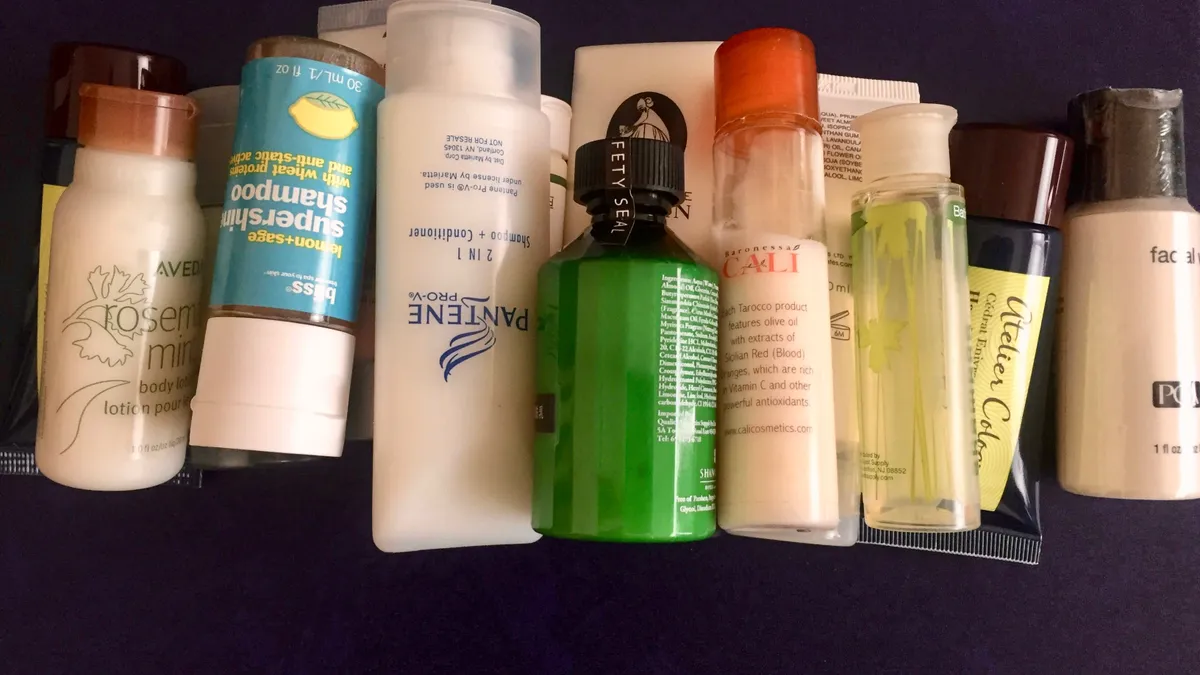Dive Brief:
- New York could become the second state to ban single-use plastic hotel toiletry bottles under 12 ounces if Gov. Andrew Cuomo signs a bill (S543) that passed last week. The bill would apply to hotels with 50 rooms or more starting in January 2024 and all others in 2025.
- Arizona Gov. Doug Ducey recently signed a bill (SB 1156) to promote "advanced" or chemical recycling, including new definitions and regulations around the process. It is now the 12th state to do so, following approval of a similar law in Oklahoma last week.
- Last week, Arkansas Gov. Asa Hutchinson signed a bill (HB1704) prohibiting municipalities and counties from limiting the use of "auxiliary containers," defined as any "bag, cup, package, container, bottle, device, or other packaging."
Dive Insight:
Policy observers anticipated the 2021 state legislative season would be active, given pent-up demand from bills stalled by the pandemic and ongoing pressure for changes to recycling policy from many sides.
The new Arkansas law follows similar preemption policies in more than a dozen states, according to analysis by the Surfrider Foundation. Details vary, but the general theme is to limit local governments from regulating bags or packaging products. In this case, the Northwest Arkansas Democrat-Gazette reports that Fayetteville – one of the state's largest cities – expects the state law will likely prohibit its policies to charge a fee for plastic bags and ban polystyrene foam food containers.
While preemption policies are still active in some states, other states are once again pursuing policies to limit or ban certain products after a temporary pause early in the pandemic. New Jersey passed a law limiting bags and polystyrene foam containers last year. Washington passed a similar foam ban this month in a bill that also notably has post-consumer recycled content requirements for plastic beverage containers.
Many of the highest-profile proposals this year focus on versions of extended producer responsibility (EPR), with bills introduced in nearly a dozen states. The sponsor of New York's EPR bill, state Sen. Todd Kaminsky, is also behind the toiletry bottle bill.
When the proposal was introduced in 2019, as amNY reported, Kaminsky's office estimated New York City hotels alone were generating 27.4 million plastic toiletry bottles annually. The issue received more attention around that time, with major hotel companies such as Marriott International pledging to eliminate the small bottles in favor of refillable dispensers. The bottles are not considered easily recyclable due to their small size. California became the first state to pass a ban in 2019, which takes effect in 2023.
While groups such as Oceana welcomed the bill's passage, saying the state "has taken an important step today in reducing its contribution to the plastic pollution problem," other plastic reduction advocates do not consider such policies a high priority.
"The Washington state bill is the most significant," said Judith Enck, president of Beyond Plastics and former U.S. EPA regional administrator, when asked via email about state plastics policies so far this year. "Many of the other bills, while well intentioned, nibble around the edges and don't embrace comprehensive policies that significantly reduce the production, use and disposal of plastics. Any state that props up chemical recycling is not serious about solving the growing problem of plastic pollution."
Arizona's chemical recycling law marks a more rapidly developing front in state plastics policy, with the American Chemistry Council (ACC) noting that 12 such laws have passed since 2017. The trade group describes these policies as helping provide a "predictable and transparent regulatory framework" for an area of recycling infrastructure seeing significant attention and investment in recent years.
While ample debate remains around the merits of approaches such as repolymerization versus plastics-to-fuel – and the EPA is hearing different opinions about whether to count this as recycling, according to Resource Recycling – major petrochemical and plastics companies see the concept as key to their sustainability pledges.
"The first step is really getting these facilities established, and then helping with that market pull through," said Craig Cookson, ACC's senior director of recycling and recovery, during the recent Plastics Recycling Conference. "As we think about how we sort through these plastics, how we collect these plastics, all these plastics draw more plastics into the system. The goal isn't to cannibalize [plastics that already have markets], but to really expand the amounts and types of plastics that are recycled."
While many of the largest state recycling proposals are still in play, and some form of federal action is still possible as well, this latest round of legislative activity shows the plastics policy debate is off to a complex start in 2021.
Additional reporting by Megan Quinn











